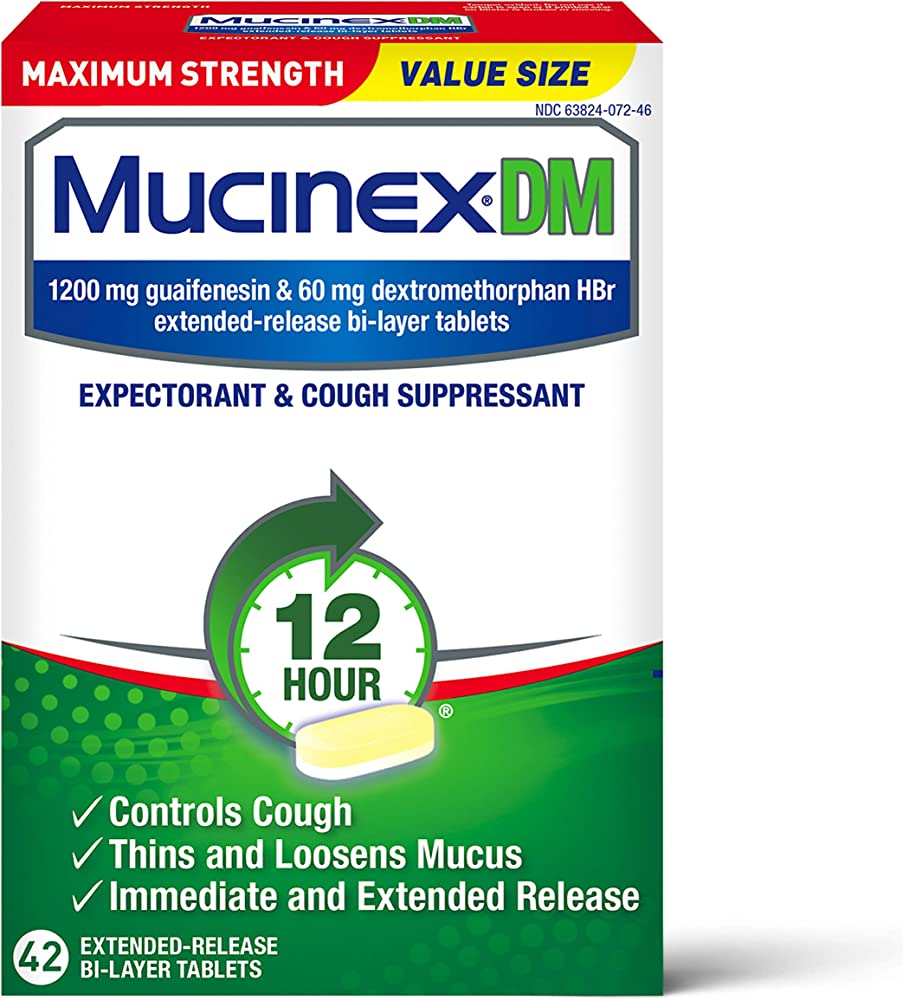Pneumonia is a serious illness that affects the lungs. It is caused by bacteria, viruses, or fungi and can be life-threatening, especially in older adults or those with weakened immune systems. Symptoms of pneumonia include cough, fever, shortness of breath, chest pain, and fatigue.
The first-line treatment for pneumonia in adults is macrolide antibiotics, such as azithromycin or erythromycin. In children, the first-line treatment for bacterial pneumonia is usually amoxicillin. These antibiotics work by killing the bacteria that are causing the infection.
In addition to antibiotics, there are several over-the-counter medications that can help alleviate symptoms of pneumonia. One such medication is Mucinex, wich contains the active ingredient guaifenesin.
Guaifenesin is an expectorant that works by thinning and loosening mucus in the lungs, making it easier to cough up. This can be helpful for people with pneumonia who are experiencing coughing and congestion. However, it is important to note that Mucinex should not be used as a substitute for antibiotics or other prescribed treatments.
It is also important to speak with a healthcare provider before taking any new medication, including Mucinex. While generally considered safe for most people, there may be certain individuals who should avoid taking this medication. For example, people with certain medical conditions or who are taking certain medications may be at an increased risk for side effects or drug interactions.
In addition to medication, there are several other home remedies that can help alleviate symptoms of pneumonia. Breathing warm, moist air can help loosen mucus in the lungs, making it easier to cough up. This can be achieved by using a humidifier or by taking a hot shower.
Staying hydrated is also important, as it can help thin out mucus and prevent dehydration. It is recommended to drink plenty of fluids, such as water, broth, or herbal tea.
While Mucinex can be helpful for alleviating symptoms of pneumonia, it should not be used as a substitute for antibiotics or other prescribed treatments. It is important to speak with a healthcare provider before taking any new medication, and to follow their instructions carefully. Additionally, home remedies such as breathing warm, moist air and staying hydrated can also be helpful in managing symptoms of pneumonia.
Does Mucinex Help Clear Lungs?
Mucinex can help clear excess mucus from the lungs. Mucinex is an expectorant medication that contais guaifenesin, which works by thinning and loosening mucus in the lungs. This makes it easier to cough up and expel the mucus from the lungs. Mucinex is specifically designed to target mucus in the respiratory system and has been clinically proven to help relieve cough and congestion caused by excess mucus. Additionally, Mucinex comes in various forms, such as tablets, liquids, and extended-release tablets, so you can choose the form that works best for your needs. It is important to follow the recommended dosage and consult with a healthcare professional if symptoms persist or worsen.

How Do You Break Up Mucus From Pneumonia?
To break up mucus from pneumonia, it is recommended to breathe in warm, moist air, which can help loosen the sticky mucus that may cause difficulty breathing. This can be achieved by placing a warm, wet washcloth loosely near your nose and mouth or by using a humidifier filled with warm water to breathe in the warm mist. In addition, drinking plenty of fluids can also help to thin the mucus, making it easier to cough up. It is important to follow the advice of a healthcare professional and take any prescribed medications as directed to effectively treat pneumonia.
What Is Best Medicine For Pneumonia?
The best medicine for pneumonia largely depends on the type of pneumonia a person has and its severity. In general, the first-line treatment for bacterial pneumonia in adults is macrolide antibiotics such as azithromycin or erythromycin. For more severe cases, a combination of antibiotics may be prescribed.
For children with bacterial pneumonia, the first-line treatment is typically amoxicillin. However, if the child is allergic to penicillin, oter antibiotics like azithromycin or clarithromycin may be prescribed.
Viral pneumonia, on the other hand, does not respond to antibiotics. The treatment for viral pneumonia includes antiviral medications, over-the-counter medications to reduce fever and inflammation, oxygen therapy, and in severe cases, hospitalization.
It is important to note that antibiotics should only be prescribed by a healthcare professional after a proper diagnosis has been made. Overuse or misuse of antibiotics can lead to antibiotic resistance and other adverse effects.
What Cough Medicine Is Best For Pneumonia?
The choice of cough medicine for pneumonia depends on the severity of the cough and the individual’s medical history. Generally, over-the-counter cough medicines containing dextromethorphan (DM) are recommended as they are effective in controlling cough and do not cause sedation. However, in some cases, stronger prescription cough medicines may be required to alleviate symptoms. These prescription cough medicines may cause sedation and sould only be taken in the quantity required to decrease the cough, but not eliminate it entirely. It is important to discuss any cough medicine options with a healthcare provider to ensure they are safe and effective for the individual’s specific situation.

Conclusion
Pneumonia is a serious respiratory illness that can affect people of all ages. It is caused by bacteria, viruses, or fungi that infect the lungs and cuse inflammation. The symptoms of pneumonia include cough, fever, chest pain, and difficulty breathing. If left untreated, pneumonia can lead to severe complications and even death. However, with prompt diagnosis and proper treatment, most people can recover from pneumonia without any long-term effects. Treatment options include antibiotics, expectorants, humidifiers, and cough medicines. It is important to seek medical attention if you suspect you have pneumonia, especially if you are in a high-risk group, such as young children, elderly adults, or people with weakened immune systems. By taking preventive measures, such as washing your hands regularly and avoiding close contact with sick people, you can reduce your risk of developing pneumonia. Remember, the key to preventing and managing pneumonia is early detection and prompt treatment.
